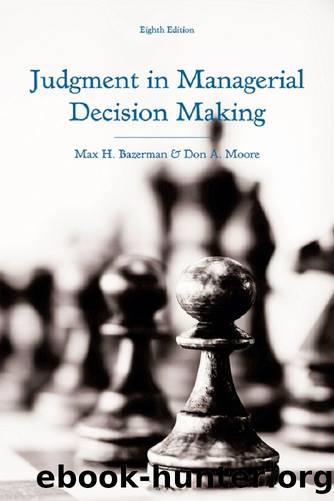Judgment in Managerial Decision Making by Max Bazerman & Max Bazerman & Don Moore

Author:Max Bazerman & Max Bazerman & Don Moore [Bazerman, Max]
Language: eng
Format: azw3
Publisher: UNKNOWN
Published: 2018-07-21T16:00:00+00:00
More than a decade and a half ago, Messick and Bazerman (1996) argued against the perspective that questions of executive ethics can be boiled down to explicit tradeoffs between ethics and profits. Rather, we asserted that a focus on psychological tendencies will lead to improved ethical decision making. We now believe that the unconscious aspects of these psychological tendencies offer the best hope for improving individual and organizational ethics.
CHAPTER NINE Common Investment Mistakes
Because money managers are paid so handsomely for their work, investment banks often have their pick of the best and the brightest. It seems reasonable to assume that these smart, hard-working people—who are generously rewarded when their investments perform well—can find ways to invest your money that will perform better than a passive index-fund strategy of putting your money in an investment fund that tracks a broad market index of stock performances. Surely even a mediocre money manager ought to be able to hand-select stocks that would perform better than an index fund.
Well, let’s look at the data. Over time, the Vanguard Index 500 fund, which tracks the S&P 500 (Standard & Poor’s index of 500 large U.S. corporations), has outperformed about 75 percent of the actively managed mutual funds in each year. Of course, you personally would not plan to invest in one of the 75 percent of funds that performs worse than the market; you would choose from among the top 25 percent. The only problem is that substantial evidence demonstrates that past stock performance is not a good predictor of future performance. While some research suggests minor relationships between past and future performance, these relationships have been small and inconsistent. That makes it very difficult to identify which funds will be in the top 25 percent in the future.
There are a lot of mutual funds—approximately 8,000—and all of them are being managed by people who would like you to believe they can outperform the market, though only an average of 25 percent will succeed in any given year. In other words, each year approximately 2,000 of these 8,000 funds will outperform the market. Of these, 25 percent, or 500, will outperform the market again the next year. And among these winners, 25 percent, or roughly 125 funds, will again outperform the market for a third year in a row. The key lesson is that there will always be funds that outperform the market for multiple years in a row, but this trend will happen roughly at random, and past performance will still have little predictive power.
By contrast, index funds are certain to perform at the level of the overall market to which they are indexed, minus a small operating fee. One reason index funds outperform the majority of mutual funds is simply that their fees are so low—often below 0.2 percent. Actively managed mutual funds have far higher
160
Common Investment Mistakes 161 expenses—often as high as two percent annually, or up to ten times higher than some index funds. What’s more, the actively managed funds usually
Download
This site does not store any files on its server. We only index and link to content provided by other sites. Please contact the content providers to delete copyright contents if any and email us, we'll remove relevant links or contents immediately.
Time Management Made Easy: How to Cultivate New Habits, Improve Productivity and Get Things Done by Joshua Strachan(2417)
The 7 Habits of Highly Effective People by Stephen R. Covey & Sean Covey(2267)
The Concise Laws of Human Nature by Robert Greene(1914)
Doesn't Hurt to Ask by Trey Gowdy(1638)
Primal Leadership by Daniel Goleman(1283)
Hook Point: How to Stand Out in a 3-Second World by Brendan Kane(1246)
Don't Sweat the Small Stuff...and It's All Small Stuff by Richard Carlson(1121)
HBR's 10 Must Reads 2021 by unknow(1096)
The Power of 100! by Shaun King(1096)
Amazon Unbound by Brad Stone(1045)
100 Things Successful People Do by Nigel Cumberland(1030)
Master of One by Jordan Raynor(1008)
HBR's 10 Must Reads 2021 by Harvard Business Review(1007)
The Job Closer by Steve Dalton(993)
Lives of the Stoics by Ryan Holiday & Stephen Hanselman(969)
Declutter Your Mind: A step by step guide to learn to control your thoughts, stop worrying, relieve anxiety and eliminate panic attacks and negative thinking by Mia Chandler(968)
Conflicted by Ian Leslie(872)
The Book of Hope by Jane Goodall(872)
Coders at Work: Reflections on the craft of programming by Peter Seibel(847)
